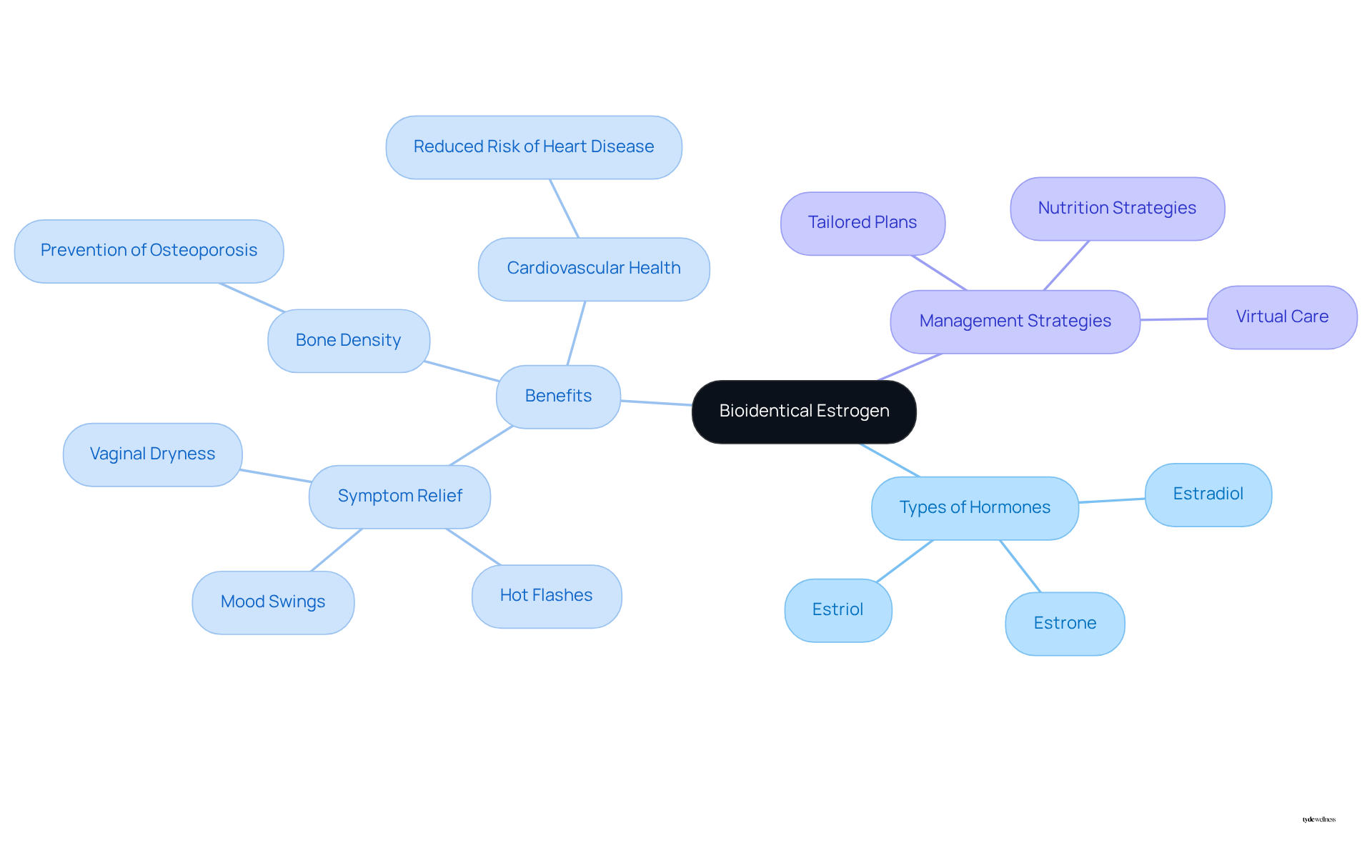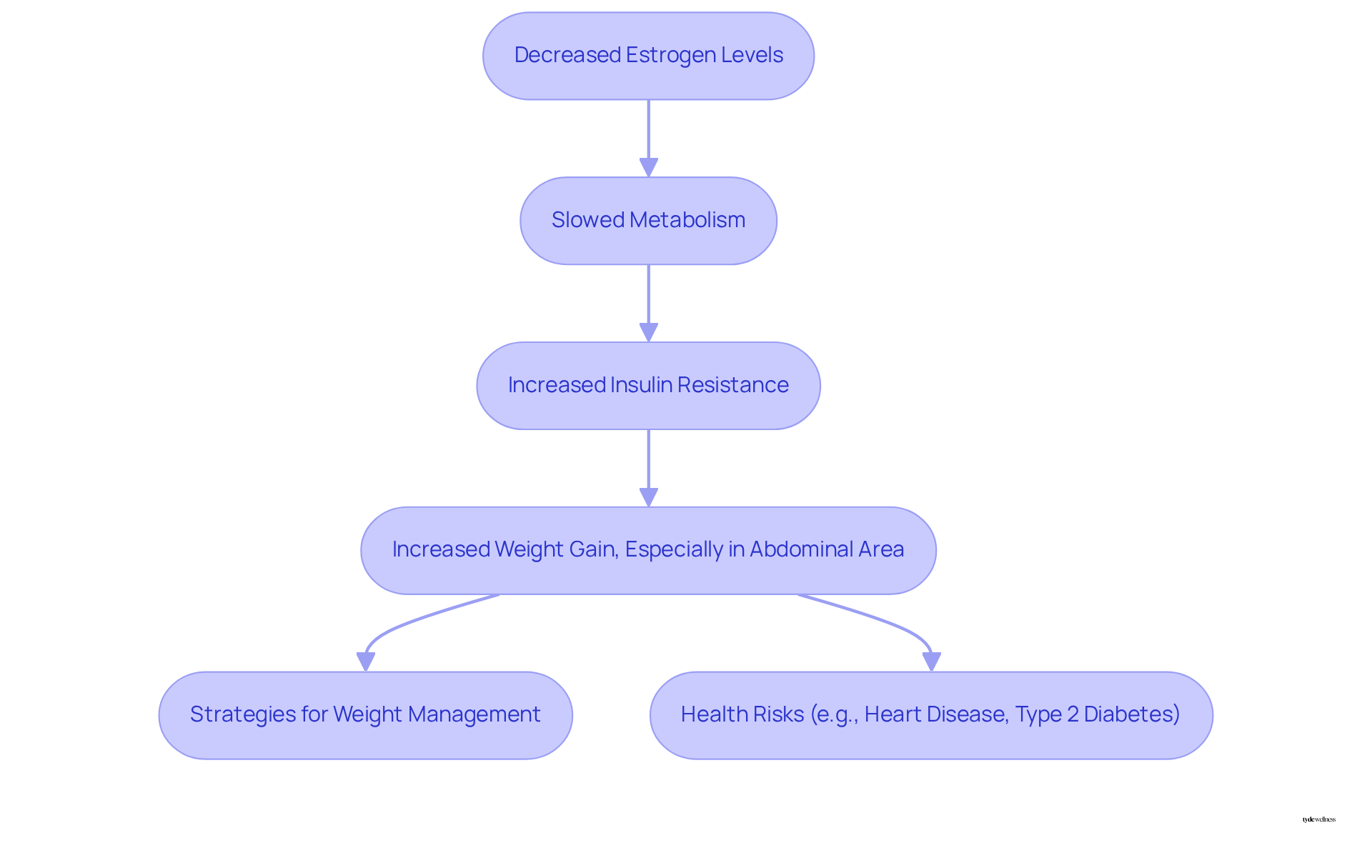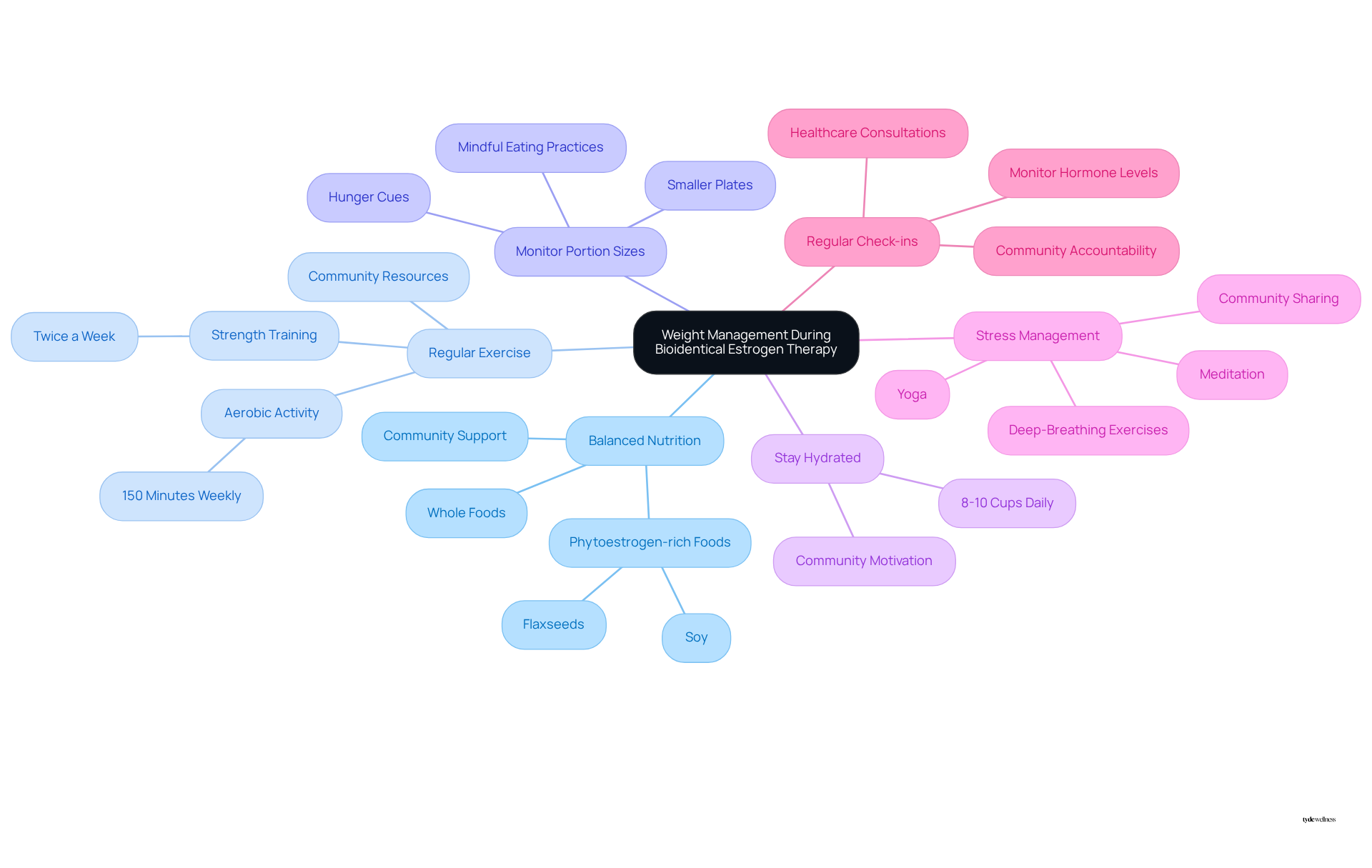Overview
Bioidentical estrogen is crucial in managing weight gain in women, especially during menopause. It significantly influences metabolism and fat distribution. Decreased estrogen levels can lead to increased fat accumulation and insulin resistance. Therefore, hormone therapy and tailored weight management strategies are essential to mitigate these effects. By understanding the role of bioidentical estrogen, women can make informed decisions about their health and weight management.
Introduction
Understanding the intricate relationship between bioidentical estrogen and weight gain is essential for women navigating the challenges of menopause. As hormone levels fluctuate, many women experience unexpected changes in body composition, particularly an increase in abdominal fat. This change can complicate weight management efforts.
This article explores how bioidentical estrogen therapy alleviates menopausal symptoms and plays a pivotal role in regulating weight. It offers insights into effective strategies for maintaining a healthy lifestyle during this transition.
What steps can women take to harness the benefits of bioidentical estrogen while mitigating the risk of weight gain?
Define Bioidentical Estrogen and Its Role in Hormonal Health
Bioidentical hormones are substances that are chemically identical to those produced by the human body, derived from plant sources to closely mimic the natural hormone levels that decline during menopause. The main types of bioidentical hormones include estradiol, estrone, and estriol.
These hormones are essential for hormonal health, effectively alleviating common menopause symptoms such as hot flashes, mood swings, and vaginal dryness. Furthermore, bioidentical hormones play a significant role in preserving bone density and supporting cardiovascular health, making them a vital component of hormone replacement therapy (HRT) for individuals experiencing hormonal imbalances. Research indicates that hormone therapy can lead to a reduction in menopausal symptoms within three to four weeks, thereby enhancing overall quality of life.
Integrating bioidentical estrogen into a management plan during menopause can be particularly beneficial. Studies show that individuals who undergo hormone therapy not only experience symptom relief but also observe improvements in their overall health, including a possible decrease in the risk of osteoporosis and cardiovascular disease. At Tyde Wellness, our board-certified obesity medicine specialists work closely with individuals to develop tailored plans that address their unique hormonal needs and weight loss objectives. We provide ongoing support through designed for busy lifestyles, text-based coaching, and virtual care, ensuring that individuals have the resources they need to maintain their health and pursue their weight loss goals.
Understanding the role of bioidentical estrogen and weight gain is crucial for those considering hormone therapy to address the challenges of menopause and support their management objectives. However, individuals with certain health conditions should be aware of the potential risks associated with hormone therapy and engage in discussions with their healthcare providers.

Explore the Link Between Estrogen Levels and Weight Gain
The regulation of body weight and fat distribution in women is significantly influenced by estrogen levels, especially in relation to bioidentical estrogen and weight gain. As menopause approaches, the decrease in hormones can lead to increased fat accumulation, particularly in the abdominal region, which may be linked to bioidentical estrogen and weight gain. This shift is largely attributed to the hormone’s influence on metabolism and appetite regulation.
Reduced hormone levels can slow metabolism, making gaining mass more likely and losing it more difficult. Moreover, decreased hormone levels lead to increased insulin resistance, complicating efforts to manage body mass. Studies show that individuals with reduced estrogen levels frequently encounter substantial gain in body mass, particularly as visceral fat, which presents several health hazards, such as heart disease and type 2 diabetes, highlighting the connection between bioidentical estrogen and weight gain.
To effectively manage weight during these hormonal transitions, it is essential for individuals to adopt a comprehensive approach. At Tyde Wellness, we provide customized nutrition plans designed for hectic schedules, assisting individuals in reducing added sugars and alcohol to manage calorie consumption. Our physician-led care guarantees that each individual receives tailored assistance, including continuous coaching and text-based help, enabling access to our community of Tyde Circle members who uplift one another through shared experiences and insights.
Engaging in at least 150 to 200 minutes of moderate aerobic activity weekly is also crucial. Understanding the relationship between hormone reduction and bioidentical estrogen and weight gain is essential for individuals seeking to efficiently. By acknowledging these changes and utilizing the comprehensive support offered at Tyde Wellness, women can adopt strategies that mitigate the impact of low hormone levels on their health, ultimately resulting in enhanced well-being.

Implement Strategies for Weight Management During Bioidentical Estrogen Therapy
To effectively manage weight during bioidentical estrogen therapy, consider the following strategies:
- Balanced Nutrition: Prioritize a diet abundant in whole foods, including fruits, vegetables, lean proteins, and healthy fats. Incorporate phytoestrogen-rich foods like flaxseeds and soy, which can naturally help balance estrogen levels. As a Tyde Circle member, you can share insights and assist other women in making informed dietary choices, utilizing resources like conversation starters and sample post ideas provided by Tyde Wellness.
- Regular Exercise: Engage in a mix of aerobic and strength training exercises. Aim for at least 150 minutes of moderate-intensity aerobic activity weekly, complemented by two days of strength training to enhance muscle mass and metabolism. offers community assistance and resources to promote regular physical activity.
- Monitor Portion Sizes: Be conscious of portion sizes to prevent overeating. Utilizing smaller plates and tuning into hunger cues can aid in regulating food intake. Sharing tips within your community can empower others to adopt similar mindful eating practices.
- Stay Hydrated: Adequate hydration is crucial for appetite control and metabolic function. Aim for 8-10 cups of water daily to support these processes. Engaging with fellow Tyde Circle members can provide motivation to maintain hydration habits.
- Stress Management: Elevated stress levels can disturb hormonal equilibrium and lead to an increase in body mass. Incorporate stress-reducing practices such as yoga, meditation, or deep-breathing exercises into your daily routine. As a member of the Tyde community, you can share your experiences and strategies for managing stress effectively.
- Regular Check-ins: Schedule consistent consultations with a healthcare provider to monitor hormone levels and adjust therapy as necessary. This guarantees that your treatment with bioidentical estrogen and weight gain remains effective and aligns with your management objectives. At Tyde Wellness, comprehensive evaluations are performed to detect imbalances in hormones that can lead to gain, and community involvement can bolster accountability in this process.
By applying these strategies and participating in the Tyde Wellness community, individuals can navigate the challenges of hormonal changes more effectively, promoting a healthier lifestyle and aiding their management efforts.

Utilize Personalized Support for Sustainable Weight Loss Solutions
Customized assistance is essential for achieving sustainable weight loss, particularly during hormonal changes. Here are effective strategies to leverage this support:
- Professional Guidance: Collaborate with a healthcare provider or nutritionist specializing in women’s health to develop a personalized weight loss plan that accounts for hormonal changes and individual lifestyle factors. At Tyde Wellness, we offer safe GLP-1 and HRT options to facilitate weight loss, ensuring your plan is tailored to your specific needs.
- Coaching Support: Engage in ongoing coaching or counseling to foster accountability and motivation. Regular check-ins can help address challenges and refine strategies as needed. Our team at Tyde Wellness is dedicated to providing compassionate, personalized support to help you regain your confidence and energy.
- Community Assistance: Participate in support groups or online communities where women share their experiences and strategies for managing body changes during menopause. This interaction promotes encouragement and offers practical insights. At Tyde, you’re never alone; our community is here to celebrate your successes and support you through challenges.
- Utilize Technology: Explore apps or online platforms that provide , exercise tracking, and progress monitoring. Tyde Wellness offers an online platform that simplifies tracking your progress and accessing your customized nutrition plans, making it easier to stay on course. Aim for at least 150 minutes of moderate-intensity exercise each week to support your management efforts.
- Integrate Hormonal Treatments: If suitable, consider incorporating hormonal therapies, such as bioidentical estrogen therapy, into your management plan. This approach can help mitigate hormonal imbalances that may be associated with bioidentical estrogen and weight gain. At Tyde Wellness, we focus on comprehensive hormone balance to effectively support your weight loss journey.
By effectively utilizing personalized support, women can navigate the complexities of weight management during hormonal changes, leading to more sustainable and lasting results.
Conclusion
Understanding the relationship between bioidentical estrogen and weight gain is essential for women navigating the challenges of menopause. Bioidentical estrogen therapy alleviates menopausal symptoms and plays a crucial role in managing weight fluctuations that often accompany hormonal changes. By addressing hormonal imbalances, women can enhance their overall health and quality of life.
Key insights regarding the impact of declining estrogen levels on metabolism, appetite regulation, and fat distribution were discussed. Strategies for effective weight management during bioidentical estrogen therapy include:
- Balanced nutrition
- Regular exercise
- Portion control
- Stress management
The importance of personalized support and community engagement in achieving sustainable weight loss was emphasized, showcasing how tailored plans and shared experiences can empower women on their health journeys.
Ultimately, embracing a comprehensive approach to managing weight during hormonal transitions is vital. By leveraging resources available through professional guidance and community support, women can navigate these changes with confidence. Taking proactive steps to understand and address the effects of low estrogen levels aids in weight management and fosters a healthier lifestyle, ensuring that women can thrive during this transformative phase of life.
Frequently Asked Questions
What are bioidentical hormones?
Bioidentical hormones are substances that are chemically identical to those produced by the human body, derived from plant sources to mimic natural hormone levels that decline during menopause.
What types of bioidentical hormones are commonly used?
The main types of bioidentical hormones include estradiol, estrone, and estriol.
How do bioidentical hormones impact hormonal health?
Bioidentical hormones alleviate common menopause symptoms such as hot flashes, mood swings, and vaginal dryness, and they play a significant role in preserving bone density and supporting cardiovascular health.
How quickly can hormone therapy alleviate menopausal symptoms?
Research indicates that hormone therapy can lead to a reduction in menopausal symptoms within three to four weeks.
What benefits can individuals expect from integrating bioidentical estrogen into their management plan during menopause?
Individuals can experience symptom relief and improvements in overall health, including a possible decrease in the risk of osteoporosis and cardiovascular disease.
What services does Tyde Wellness offer for individuals considering hormone therapy?
Tyde Wellness provides tailored plans addressing unique hormonal needs and weight loss objectives, along with ongoing support through nutrition strategies, text-based coaching, and virtual care.
Why is it important to understand the role of bioidentical estrogen in relation to weight gain?
Understanding this role is crucial for those considering hormone therapy to effectively address menopause challenges and support their management objectives.
Are there any risks associated with hormone therapy?
Yes, individuals with certain health conditions should be aware of potential risks associated with hormone therapy and should discuss these with their healthcare providers.
List of Sources
- Define Bioidentical Estrogen and Its Role in Hormonal Health
- FDA commissioner stirs debate over hormone therapy for menopause (https://thehill.com/policy/healthcare/5412519-hormone-therapy-black-box-warning)
- Hormones for menopause are safe, study finds. Here’s what changed (https://npr.org/sections/health-shots/2024/05/01/1248525256/hormones-menopause-hormone-therapy-hot-flashes)
- As GLP-1 compounding stares down a wall, telehealth companies pivot to hormones (https://statnews.com/2025/03/11/telehealth-firms-pivot-from-glp1-weight-loss-drugs-to-hormone-replacement-therapy)
- Menopause Hormone Therapy is Making a Comeback: Is it Safe and Right for You? | (https://longevity.stanford.edu/lifestyle/2025/03/06/menopause-hormone-therapy-is-making-a-comeback-is-it-safe-and-right-for-you)
- After Decades of Misunderstanding, Menopause is Finally Having Its Moment (https://medicine.yale.edu/news-article/after-decades-of-misunderstanding-menopause-is-finally-having-its-moment)
- Explore the Link Between Estrogen Levels and Weight Gain
- Menopause Hormone Therapy Boosts GLP-1 Drug Effectiveness, Researchers Say (https://usnews.com/news/health-news/articles/2025-07-14/menopause-hormone-therapy-boosts-glp-1-drug-effectiveness-researchers-say)
- The reality of menopause weight gain (https://mayoclinic.org/healthy-lifestyle/womens-health/in-depth/menopause-weight-gain/art-20046058)
- Menopause Weight Gain Isn’t Inevitable (https://health.clevelandclinic.org/what-can-i-do-to-avoid-weight-gain-at-menopause)
- Black box warning on menopause hormone therapies should be removed, experts say | CNN (https://cnn.com/2025/07/24/health/menopause-hormone-treatment-wellness)
- What Women With Perimenopause Weight Gain Should Know Before Going on GLP1s – WTOP News (https://wtop.com/news/2025/07/what-women-with-perimenopause-weight-gain-should-know-before-going-on-glp1s)
- Implement Strategies for Weight Management During Bioidentical Estrogen Therapy
- Can Bioidentical Hormone Therapy Help with Weight Management | David (https://davidghozland.com/can-bioidentical-hormone-therapy-help-with-weight-management)
- Combining Hormone Replacement Therapy and GLP-1s: A Dual Approach to Support Weight Loss in Menopausal Women – ScriptWorks, Compounding Pharmacy in Walnut Creek, California (https://scriptworksrx.com/blog/menopausal-weight-loss-bhrt-estrogen-glp-1-agonists-california)
- Hormone Replacement Therapy Aids in Weight Loss | HerKare (https://herkare.com/blog/hormone-replacement-therapy-weight-loss)
- | Expert Insights on Integrative Medicine | 417 Integrative Medicine (https://417integrativemedicine.com/articles/will-i-lose-weight-with-bioidentical-hormones)
- Menopause Weight Gain (https://norehealth.com/weight-gain-and-the-inability-to-lose-weight-treatment)
- Utilize Personalized Support for Sustainable Weight Loss Solutions
- Managing Weight Gain During Perimenopause: Expert Tips Meta Description: Perimenopause often brings hormonal changes and weight gain. Learn how to manage this transition with balanced nutrition, exercise, and personalized support from Southern NH Weight Management. Specialist Heather Newell, APRN, shares insights to help you regain control. (https://snhhealth.org/about-us/about-snhh/news-and-articles/weight-gain-perimenopause-understanding-causes-and-taking-control)
- Weight Loss and Menopause | Annandale OB-GYN (https://annandaleobgyn.com/news/weight-loss-and-menopause)
- Women turn to weight loss drugs in menopause: What to know about the benefits and risks (https://abcnews.go.com/GMA/Wellness/women-turn-weight-loss-drugs-menopause-benefits-risks/story?id=115067358)
- Can a Personalized Weight Loss Program Help During Menopause? – Nava Health (https://navacenter.com/can-a-personalized-weight-loss-program-help-during-menopause)
- WeightWatchers Completes Financial Reorganization, Strengthens Leadership, and Expands Program Innovation to Support Women Through Menopause (https://corporate.ww.com/news/news-details/2025/WeightWatchers-Completes-Financial-Reorganization-Strengthens-Leadership-and-Expands-Program-Innovation-to-Support-Women-Through-Menopause/default.aspx)



